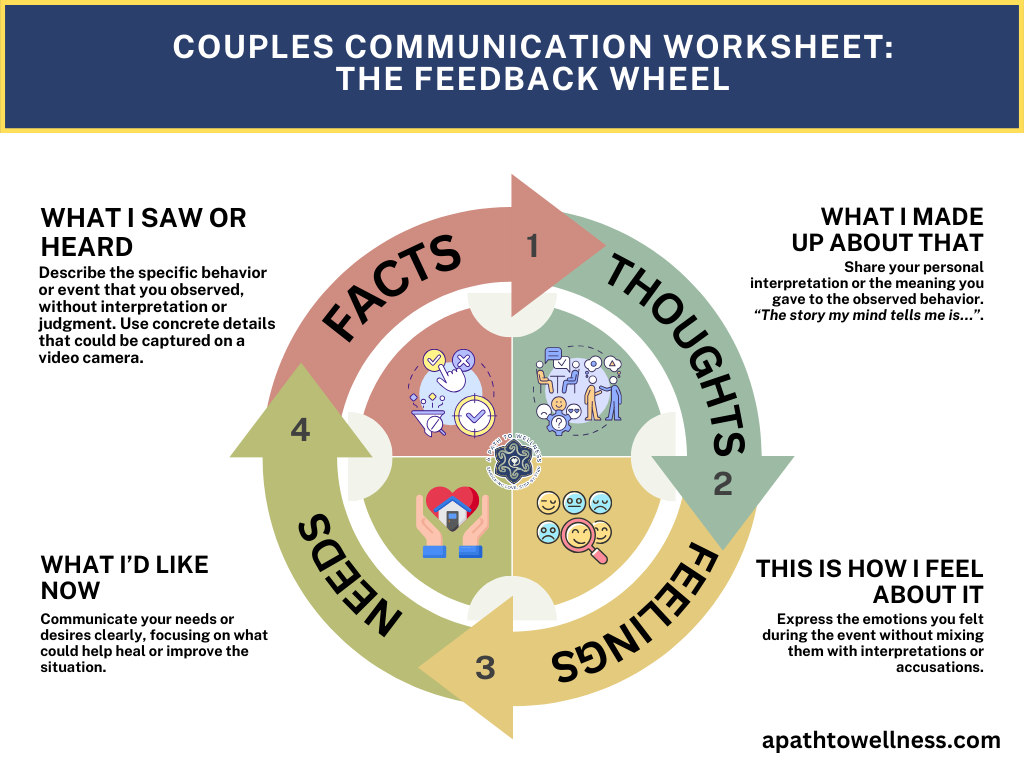Arguments are an inevitable part of any relationship, but what sets healthy couples apart is how they handle conflict resolution. Instead of letting conflicts simmer or avoiding discussions altogether, many couples find growth by doing a “post-mortem” on their arguments. This intentional and structured approach allows couples to analyze what happened, understand their individual roles, and prevent future misunderstandings.
Why Should Couples Do a Post-Mortem on Arguments?
Arguments can be painful, but they also provide an opportunity for reflection and growth. Here are a few reasons why a post-mortem can be transformative:
- Builds Emotional Resilience: By calmly revisiting the argument, couples practice emotional regulation and become more resilient in the face of future disagreements.
- Reduces Repetitive Conflicts: A structured post-mortem helps couples identify recurring themes and patterns, making it easier to avoid the same issues in the future.
- Increases Mutual Understanding: When both partners reflect on their behaviors and emotions, they gain insights into each other’s triggers and needs, fostering empathy and connection.
- Promotes Accountability: Instead of blaming each other, a post-mortem encourages self-reflection, helping each partner to acknowledge and take responsibility for their role in the conflict.
- Strengthens Bond: Working together to understand and grow from conflicts enhances intimacy and trust, creating a stronger bond between partners.
Incorporating a post-mortem as a regular part of conflict resolution can create a culture of accountability, empathy, and growth in your relationship.
How to Conduct a Post-Mortem on an Argument in 5 Steps
- Establish a Safe Space for Reflection
Setting up a calm and non-judgmental environment is essential for any meaningful post-mortem. Choose a time when emotions are not running high—ideally after both partners have had a chance to cool down. Set an intention to listen actively, withhold judgment, and approach the process with an open heart. - Set Clear Goals and Guidelines
Define the purpose of the post-mortem before diving in. This step is crucial for staying focused on learning from the argument rather than rehashing old frustrations. Consider these guidelines:- Agree on Respectful Communication: Commit to using “I” statements rather than accusatory language.
- Emphasize Self-Reflection: The aim is to understand your own actions and responses as much as, if not more than, your partner’s.
- Focus on Solutions: Keep the conversation forward-thinking and solution-oriented.
- Ask Reflective Questions to Guide the Discussion
Structured questions help couples analyze the conflict in a way that minimizes defensiveness. Below are questions to foster introspection and mutual understanding:- Personal Reflection:
- What emotions was I feeling before, during, and after the argument?
- What past experiences or expectations might have intensified my reaction?
- Was there a personal need or boundary I felt was being overlooked or challenged?
- Understanding Triggers and Reactions:
- Were there specific words, actions, or tones that triggered a strong reaction?
- How did I contribute to the escalation of the argument?
- Did I listen to my partner’s perspective without interrupting or assuming?
- Owning Your Role:
- How might my actions or words have impacted my partner’s responses?
- What unspoken expectations did I have during the argument?
- What assumptions did I make about my partner’s intentions?
- Reaching Solutions Together:
- What can we both learn from this argument to prevent similar issues in the future?
- Are there adjustments I can make to communicate my needs more effectively?
- What positive changes can we implement to support each other’s well-being?
- Personal Reflection:
- Take Ownership and Acknowledge Missteps
Accountability is crucial in any post-mortem. Each partner should openly acknowledge any missteps and take ownership of their actions. This step can be uncomfortable but is essential for genuine growth and healing.
Examples of ownership statements:- “I realize that when I interrupted you, it made you feel unheard, and I’m sorry for that.”
- “I see that my tone may have come across as dismissive, and that wasn’t my intention.”
- Remember, taking responsibility does not imply full blame but rather a willingness to own one’s contribution to the conflict.
- Conclude with Solutions and Future Commitments
Ending the post-mortem with actionable steps for the future helps reinforce a sense of partnership and mutual support. Together, outline steps you both agree to take when similar issues arise. This could include strategies such as:- Improving Communication: Agreeing to use active listening techniques, taking breaks when emotions run high, or setting regular check-ins to address potential issues.
- Honoring Boundaries: Establishing boundaries that respect each partner’s emotional triggers and vulnerabilities.
- Creating Safe Words: Developing a “safe word” that either partner can use to signal a need for a pause in the discussion.
Benefits of Doing a Post-Mortem on Arguments
Taking the time to analyze and learn from arguments has long-term benefits, including:
- Reduced Defensiveness: Structured reflection reduces the need for defensive reactions, fostering an environment where both partners feel safe to share honestly.
- Enhanced Self-Awareness: A regular post-mortem process promotes self-awareness, helping each partner understand their own needs, expectations, and potential triggers.
- More Effective Communication: When couples reflect on their arguments, they identify communication barriers and learn how to express themselves more clearly.
- Deeper Emotional Connection: Working through issues together builds trust and intimacy, creating a more secure attachment.
- Positive Conflict Resolution Cycle: By regularly resolving conflicts in a healthy manner, couples establish a positive conflict resolution cycle, which can transform even the most challenging disagreements into opportunities for connection and growth.
Outbound Resources
For further reading, consider exploring these reputable resources:
- American Association for Marriage and Family Therapy (AAMFT): Find information on conflict resolution and relationship counseling.
- Gottman Institute: Research-backed insights and resources on strengthening relationships and improving communication.
Final Thoughts
Arguments are an unavoidable aspect of relationships, but how you approach and learn from them can make all the difference. Engaging in a thoughtful, structured post-mortem helps couples understand each other more deeply, recognize patterns, and avoid repetitive conflicts. Remember, the goal is not to assign blame but to foster understanding and growth. When couples commit to working through issues together, they build a strong, resilient partnership capable of facing challenges with empathy and grace. Embrace the post-mortem process as a tool for continual improvement and a pathway to a healthier, more fulfilling relationship.











